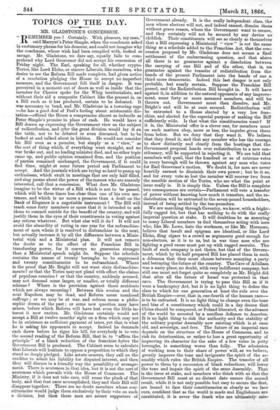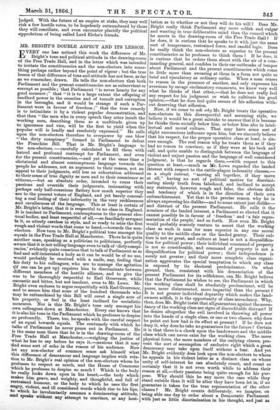TOPICS OF THE DAY.
MR. GLADSTONE'S CONCESSION.
REMEMBER yov. Certainly. With pleasure, my man," said Marryat's Peter Simple, when the coachman asked in customary phrase for his douceur, and could not imagine why the coachman, whose wish had been complied with, looked so savage. Mr. Gladstone, we dare say, equally fails to com- prehend why Lord Grosvenor did not accept his concession of Friday night. The Earl, speaking for all, whether crypto- Tories, like Lord Elcho, or sincere Liberals, like ourselves, who desire to see the Reform Bill made complete, had given notice of a resolution pledging the House to accept no imperfect measure, and the Government felt itself in danger. It was perceived in a moment out of doors as well as inside that the member for Chester spoke for the Whig territorialists, and without their aid a composite Cabinet like the present is, on a Bill such as it has produced, certain to be defeated. It was necessary to bend, and Mr. Gladstone in a towering rage —he has a good deal of Peel's feeling about aristocratic dic- tation—offered the House a compromise almost as imbecile as Peter Simple's promise in place of cash. He would have a Bill drawn up expressing the Government view on the subject of redistribution, and after the great division would lay it on the table, not to be debated or even discussed, but to be looked at and talked about in lobbies. He would not consider his Bill even as a promise, but simply as a " view," as the sort of thing which, if everything went straight, and no war broke out, and no leading minister died, and no other topic came up, and public opinion remained firm, and the position of parties remained unchanged, the Government, if it could find time, might at some future period ask Parliament to accept. And the journals which are trying so hard to pump up enthusiasm, which exult in meetings that are only half filled, and sing 'means about the power of the masses who are scarcely interested, call that a concession. What does Mr. Gladstone imagine to be the virtue of a Bill which is not to be passed, which will be three times less clear than one of his own sen- tences, and which is no more a promise than a draft on the Bank of Elegance is a negotiable instrument The Bill will teach some forty members or more that it is intended to ask them to commit suicide for the benefit of the country, and will justify them in the eyes of their constituents in voting against any reform whatever. But what else will it do I It will not avoid the absurdity of voting in one year for the enfranchise- ment of men whom it is resolved to disfranchise in the next, but actually increase it by all the difference between a Minis- terial wish and a Ministerial plan. It will not remove the doubt as to the effect of the Franchise Bill in transferring power, for it conveys no guarantee stronger than a Ministerial speech might do. Suppose the schedule contains the names of twenty boroughs to be suppressed and twenty constituencies to be enfranchised. Where is the proof that Mr. Bright will not want sixty disfranchise- malts ? or that the Tories may not plead with effect the claims of populous counties ? or that the country, suddenly aroused, may not demand some larger, or smaller, or totally different scheme ? Where is the provision against those accidents which are always recurring V Between this session and the next Napoleon may be dead, and Reform mean manhood suffrage ; or we may be at war, and reform mean a philo- sophic dream of the past ; or some new question may have arisen, before which Reform will have lost even the little in- terest it now excites. Mr. Gladstone certainly would not accept a Bill at twelve months' sight on a firm which may not be in existence as sufficient payment of taxes, yet that is what he is asking his opponents to accept. Indeed he demands cash down before he signs his bill, for everybody is to vote the second reading of the Reform Bill, that is, to " affirm the principle " of a blank reduction of the franchise before the Government Bill is produced. The Cabinet seem to calculate that Liberals will hesitate to oppose a proposition to which they stand so deeply pledged. Like astute usurers, they call on the creditor to admit his liability for disputed interest, and then they will discuss in a friendly way the possibility of arrange- ment. There is acuteness in that idea, but it is not the sort of acuteness which prevails with the House of Commons. The Ministry, if it does not take care, will rouse the pluck of that body, and that feat once accomplished, they and their Bill will disappear together. There are no doubt members whose con- stituencies would judge them exclusively by their vote on such a division, but then these men are secure supporters of Government already. It is the really independent class, the men whose electors will not, and indeed cannot, dismiss them without grave reason, whom the Government want to secure,. and they certainly will not be secured by any device so childish. Their constituents will see as clearly as themselves that a Bill expressing a Ministerial " view " is not the same thing as a schedule added to the Franchise Act, that the con- cession proposed by Mr. Gladstone does not secure a final settlement of the embarrassing question, and that abOve all there is no guarantee against a dissolution between the carrying of one Bill and of tie other, that is, no guarantee against the transfer of redistribution from the hands of the present Parliament into the hands of one a. third more democratic. Indeed this last danger is not only probable, but nearly certain. Suppose the Franchise Bill passed, and the Redistribution Bill brought in. It will have against it, in addition to the natural opponents of any improve- ment, some forty or more menaced members, and will be thrown out. Government must then dissolve, and Mr. Bright's end will be at once secured. Redistribution will be entrusted to a House elected by a very low fran- chise, and elected for the especial purpose of m. king the Bill sufficiently wide. Is that what the constituencies want ? If it is, the Ministerial offer is a clever one, for members must on such matters obey, more or less, the impulse given them from below. But we deny that they want it. We believe that they dread it, and that any member who has the courage to show distinctly and clearly from the hustings that the. Government proposal hands over redistribution to a new con- stituency, will be supported in rejecting it. We are told that members will quail, that the hundred or so of extreme votes in every borough will be thrown against any man who votes for Earl Grosvenor's motion. We doubt it, for men are never heartily earnest to diminish their own power ; but be it so, and for every vote so lost the member will recover two from the sensible section of the Tories, who see what the point at issue really is. It is simply this. Unless the Bill is complete two consequences are certain—Parliament will vote a transfer of power without knowing how much it transfers, and the re- distribution will be entrusted to the seven-pound householders, instead of being settled by the ten-pounders.
We are marching through Coventry, we know, with a. fright- fully ragged lot, but that has nothing to do with the really imperial question at stake. It will doubtless be as annoying• to many Liberal members to find themselves acting with men who, like Mr. Lowe, hate the workmen, or like Mr. Horsman, believe that insult and epigram are identical, or like Lord Elcho, fling cigars to a crowd as arguments good enough for non-electors, as it is to us, but in war time men who are fighting a good cause must put up with ragged recruits. The fault of such company is not theirs, but that of the Govern- ment, which by its half prepared Bill has placed them in such a dilemma that they must choose between annoying a party and betraying the future of the country. The Cave of Adullans was a nasty place, no doubt, with very indifferent company, but still one must not forget quite so completely as Mr. Bright did_ that after all the future of Israel was protected in that. cave. The Government is trying to pass this Bill as if it. were a bankruptcy Act, but it is no light thing to define the class to which for one generation at least.the rule over the British Empire—over, that is, one-fourth of the human race— is to be entrusted. It is no light thing to change even the tone and bias of a constituency which could in a day decree that China should be conquered, or Poland liberated, or the advance of the world be arrested by a needless defiance to America.. It is no light thing to risk the authority and the stability of the solitary popular Assembly now existing which is at once old, and sovereign, and free. The future of an imperial race depends on the structure of the House of Commons, and to risk its deterioration, or rather to lose a great opportunity of improving its character for the sake of a few votes in petty boroughs, is something worse than folly. The admission of working men to their share of power will, as we believe, greatly improve the tone and invigorate the spirit of the as- sembly which rules the British Empire. The transfer of all power to them by a succession of blank reductions, will lower the tone and impair the spirit of the same Assembly. That is the issue at stake, and members who think with us that the Government Bill must at no distant date ensure the second result,• while it is not only possible but easy to secure the first, are bound to face their constituencies as clearly as we face ours, confident that as the world is made and Englishmen are constituted, it is never the frank who are ultimately mis- judged. With the future of an empire at stake, they may well risk a few hostile votes, to be hopelessly outnumbered by those they will conciliate, and even encounter placidly the political opprobrium of being called Lord Elcho's friends.































 Previous page
Previous page